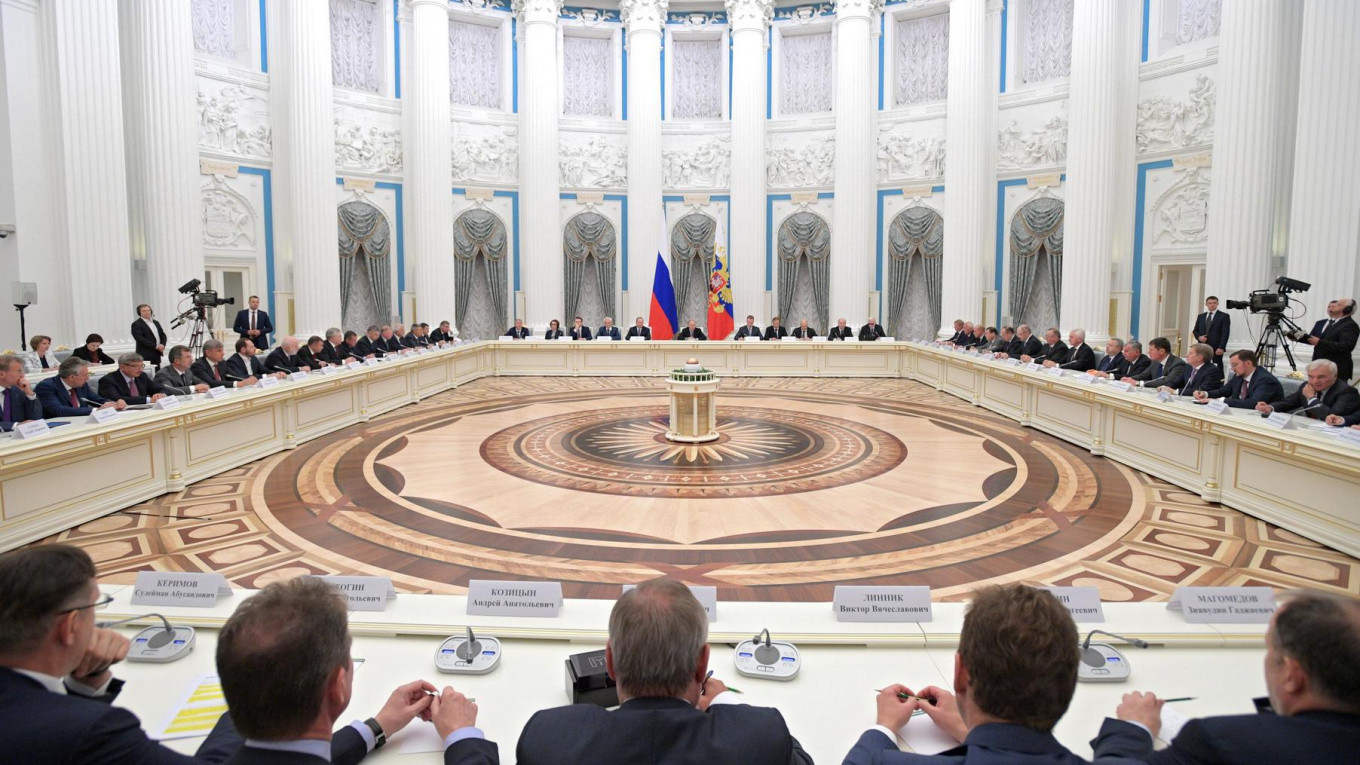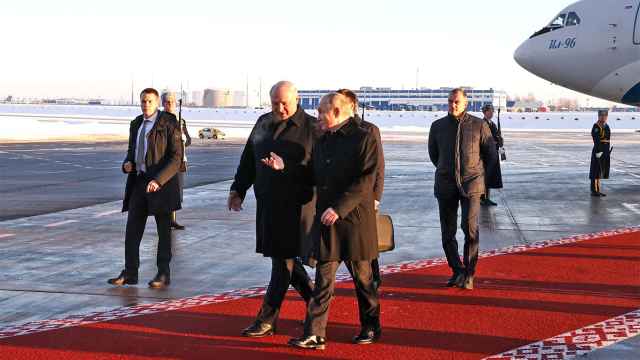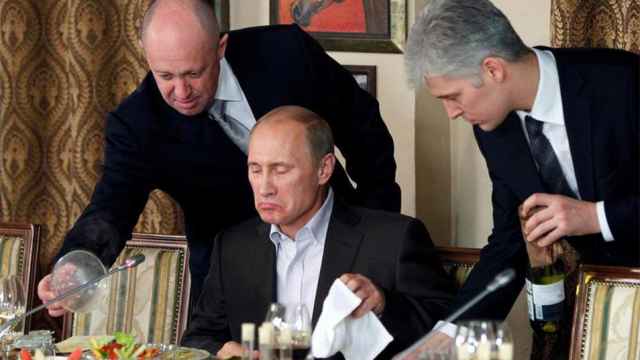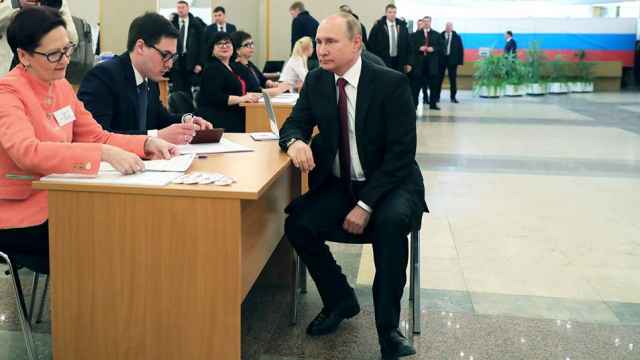Given the financial and personal costs suffered over the past three years by Russian oligarchs, some analysts have wondered whether they might actively intervene to replace the Russian leadership.
Given that Russia saw a major oligarchic political intervention just over 20 years ago, the question doesn’t seem unwarranted. In 2014 alone, a combination of low oil prices and sanctions saw Russia’s 20 richest individuals lose a total of $62 billion.
Holiday travel to popular destinations such as Miami and the south of France is now impossible for those sanctioned, and some have even lost international assets.
Risk-averse Western multinationals have pulled back from deal-making with large Russian firms due to substantial political risk.
The threat of even more individuals coming under personal sanctions still looms: in February Congress expects a new report on Russian oligarchs that may lead to additional sanctions or other restrictions.
Yet throughout this upheaval, little has changed at the high levels of business-government relations in Russia. No oligarchs have broken rank with the Putin regime, choosing instead to signal their commitment by attacking a prominent anti-corruption activist, cleaning up the environment at Putin’s behest and possibly facilitating electoral interference in the U.S.
Why have the oligarchs remained loyal?
The answer lies in Russia’s adept use of carrots and sticks to bind the oligarchs more closely to the regime. The Putin administration has spent lavishly to convince the heads of the business community that it is the only game in town: a popular, competent, but also merciless government that faces no real alternatives to its hold on power.
However, this co-optation strategy carries a unique set of risks as well as critical implications for U.S. policymaking going forward. Oligarchs in Russia are now more invested in domestic politics than ever, made dependent on government action to protect and grow their wealth.
Their renewed interest in how the Russian government functions could increase the likelihood of real reforms taking place. U.S. policies can promote this turn inward by cutting off ways for oligarchs to illegally stash their wealth abroad and helping develop a more diversified economy in Russia.
Who are the oligarchs?
Russian oligarchs generally fall into several distinct subgroups. First and foremost, an incredible amount of wealth is concentrated in the so-called “inner circle,” individuals who are either childhood friends, long-time associates or even relatives of Vladimir Putin. These include Gennady Timchenko, whose net worth as of Nov. 28 was estimated at $15 billion, Arkady Rotenberg ($2.4 billion), his brother Boris ($ 1 billion) and Yuri Kovalchuk ( $1.2 billion).
A second group arrives from the security sector (e.g., Igor Sechin, the CEO of oil behemoth Rosneft, which is valued at $80 billion, and Sergei Chemezov, CEO of the high-tech industrial conglomerate Rostec, whose 2016 revenue was about $19 billion). Some of these men are not personally friendly with Putin but capitalize on networks within resurgent intelligence agencies.
Finally, there are the so-called “holdovers,” i.e. powerful businesspeople who owe their fortunes to connections with previous presidential administrations, such as Mikhail Fridman ($15.1 billion) and Vladimir Potanin ($14.9 billion) from the Yeltsin era and Ziyavudin Magomedov ($1.5 billion) from the Medvedev era.
Understanding how these oligarchs built their wealth goes a long way in predicting their future loyalty to Putin.
The commitment of the inner circle often goes unquestioned, as the future of their massive business empires requires staying in Putin’s good graces. But oligarchs coming from the intelligence services owe no particular allegiance and may be more interested in ensuring that the defense-industrial complex receives special treatment from the state.
Same for the holdovers from previous eras, who have suffered some attacks from the Putin government over the years, mainly in the form of expropriation through politically motivated court cases — the state’s main tool against the oligarchs.
They may be tiring of the uncertainty surrounding their property rights and have an incentive to demand different political institutions to protect their assets. Coaxing these groups to remain loyal requires the strategic use of rewards and repression.
Cultivating loyalty through money and popularity
First, the Russian government has spent incredible resources to directly compensate oligarchs for their financial losses.
Massive infrastructure contracts such as bridges and pipelines find their way into the hands of the connected elite, while import substitution policies in sectors such as agriculture help create enormous profits for investors. Government bailouts to the tune of tens of billions of dollars have stabilized balance sheets, while the state has also taken over toxic assets such as those gone unused after the Sochi Olympics.
Earlier this year, a law passed that even retroactively offered tax refunds to many of the individuals hit by international sanctions. It’s not hard to stay loyal when one is making out well financially, and data from 2016 suggest that Russian billionaires are bouncing back.
Next, Putin’s government has tried to earn loyalty by demonstrating both its popularity among citizens and its managerial competence. Oligarchs want to be confident that their government is still able to perform at a high level in response to crises. Otherwise, elites sense a sinking ship and begin to flee.
The annexation of Crimea and, to a lesser extent, military adventurism in Ukraine and Syria successfully rallied the Russian populace around the flag, while tight control over domestic media has sustained the narrative that the Putin administration is effectively returning Russia to great power status.
The government has taken steps to reassure oligarchs that the country is still in capable hands. Officials guilty of egregious mistakes have been shown the door, such as Vladimir Yakunin at Russian Railways, at the same time as competent technocrats govern the Central Bank and work to improve the investment environment. Maintaining support from elites requires learning, adapting and improving government performance over time.
Divide, repatriate and conquer
But the Russian government’s approach to securing oligarchic loyalty uses sticks as well as carrots. First, remember no oligarch wants to defect alone.
Mounting a challenge to the regime requires coordinated action from powerful elites, who must bond together to withstand inevitable retribution. The Putin administration has acted forcefully to deprive oligarchs of autonomous institutions that could help organize this type of political cooperation.
Opposition figures such as Alexei Navalny face unrelenting repression, and businesses that try to financially support such challengers come under fire from officials. Even business associations have been effectively neutered and made dependent on the regime.
Without such organizations, oligarchs will remain burdened by their own personal conflicts and will not be able to draw on their collective power, while seeing little benefit from striking out on their own.
Moreover, the generosity of the government comes with strings attached.
The central state has been markedly strengthened since the 1990s, when oligarchs could ride roughshod over government institutions, and is seen as the main force behind raiding and property grabs. By tacitly approving the expropriation of several oligarchs (for example, in the case of Vladimir Yevtushenkov and Bashneft), Putin has shown that the state still holds the trump card to deal with those it deems to have fallen out of line.
If oligarchs believe their money to be safe abroad, they might mount riskier, more ambitious challenges to the regime. The government has tried to get out ahead of this type of threat by passing legislation requiring top officials working in government, the Duma and state-owned enterprises (many of whom command business empires) to close foreign bank accounts and sell their real estate abroad.
This move forms part of a larger de-offshorization campaign that provides incentives for large commercial holdings to bring their assets back to Russia.
Oligarchs are given a choice: Remain in Russia, pay your taxes and profess allegiance, or pack up and move abroad. The government may be ready to lose out on some tax revenue to reap these political benefits.
A role for the West
Compelling oligarchs to repatriate their capital and redouble their investment in the domestic economy raises their expectations of the government’s ability to improve the ease of doing business.
In that sense, Russia’s moves to repatriate its oligarchs are a double-edged sword: True, the West’s leverage is weakened when Russian oligarchs own fewer assets abroad and derive a larger part of their profits from domestic markets, but this makes Moscow more vulnerable as well, raising the risk of a backlash if oligarchic expectations of wealth protections are not met.
In the long run—now that Russia’s oligarchs are major taxpayers and their wealth more concretely depends on policies implemented at home—they will be more interested in making sure property rights are protected, regulations become less cumbersome and officials are held accountable.
To date, relations with oligarchs have been handled on an individual basis, with Putin as the ultimate arbiter. But with so many oligarchs now reliant on the federal government and the domestic economy to make money, this arrangement may prove unsustainable. Reforms in Russia will ultimately originate from within, propelled by elites that are dissatisfied with their treatment by state institutions yet also committed to sticking around and finding solutions.
The U.S. can take steps to make it easier for oligarchs to become more active participants in their own domestic affairs. First, measures should be taken to aggressively combat money laundering and close off remaining opportunities for Russian elites to stash illicit assets abroad.
Congress must act to force the disclosure of beneficial owners in real estate transactions across the country and at the time of corporate registration. Oligarchs connected to sanctioned firms cannot be allowed to register their private jets in the United States through opaque offshore companies.
Greater scrutiny must also be paid to cross-border loans that are later written off, a key tool that Russian oligarchs and government agencies have used to both launder money and support political actors abroad.
Russia’s oligarchs are increasingly interested in making sure property rights are protected, regulations become less cumbersome and officials are held accountable
Some of the money laundered helps fund the children of oligarchs to attend elite private schools, rather than investing in Russia’s own education system. A goal of U.S. foreign policy should be to assist Russia’s move to bring oligarchic wealth back onshore in the hope that these elites, as investors and taxpayers, might contribute to economic and political reforms to protect their own interests.
This also relates to the current sanctions regime.
Many observers have expressed skepticism about the effectiveness of this policy, noting that restricting the ability of certain leaders and firms to do business and travel abroad has not sufficiently constrained Russian foreign policy. But, by design, the effects of sanctions are not going to be felt in the short run, especially since the Russian government is spending vast sums to prop up those targeted.
Russia cannot subsidize and cater to oligarchs indefinitely; neither can it afford the economic cost, nor will the public tolerate such upwards redistribution. Sanctions (and counter-sanctions) force key actors in Russia to develop alternative sources of economic growth beyond natural resources.
A more diversified Russian economy requires the government to respond to a broader set of economic interests, adopt more inclusive policies that appeal to different business groups and deliver improvements to the business environment (which could involve elements of democratization).
These developments would all be a net positive for the United States and could facilitate future engagement on a more robust economic footing.
David Szakonyi is an assistant professor of political science at George Washington University, a research fellow at the International Center for the Study of Institutions and Development at the Higher School of Economics in Moscow and, for the 2017-2018 academic year, an academy scholar at the Weatherhead Center for International Affairs at Harvard University.
The views and opinions expressed in opinion pieces do not necessarily reflect the position of The Moscow Times.
This article was originally published by russiamatters.org
A Message from The Moscow Times:
Dear readers,
We are facing unprecedented challenges. Russia's Prosecutor General's Office has designated The Moscow Times as an "undesirable" organization, criminalizing our work and putting our staff at risk of prosecution. This follows our earlier unjust labeling as a "foreign agent."
These actions are direct attempts to silence independent journalism in Russia. The authorities claim our work "discredits the decisions of the Russian leadership." We see things differently: we strive to provide accurate, unbiased reporting on Russia.
We, the journalists of The Moscow Times, refuse to be silenced. But to continue our work, we need your help.
Your support, no matter how small, makes a world of difference. If you can, please support us monthly starting from just $2. It's quick to set up, and every contribution makes a significant impact.
By supporting The Moscow Times, you're defending open, independent journalism in the face of repression. Thank you for standing with us.
Remind me later.







